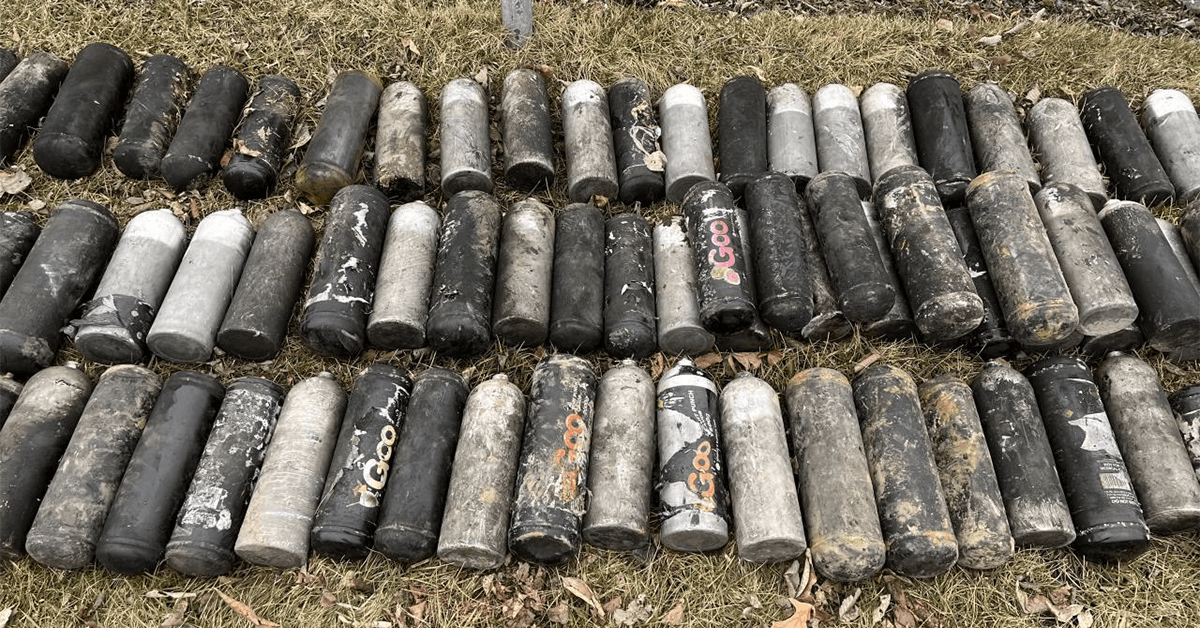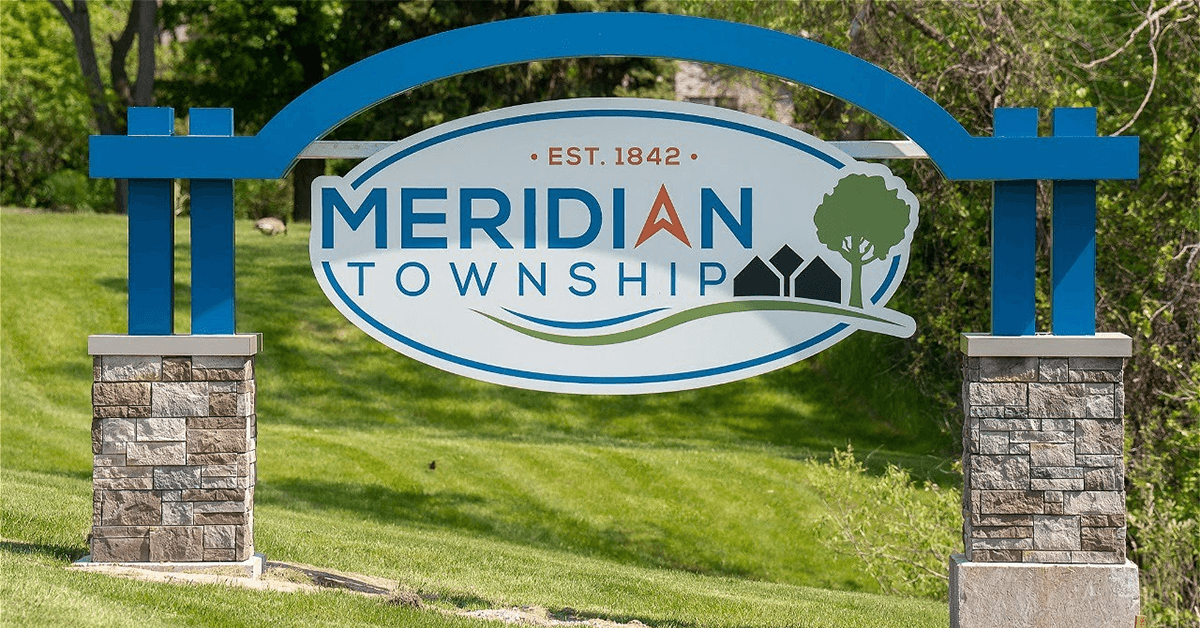EPA Launches Hazardous Material Cleanup Following Deadly Vape Shop Explosion

Note to our readers: While this incident is not directly related to cannabis, it tangentially connects to the broader cannabis industry due to the involvement of Delta-8 THC products. The explosion in Clinton Township involved a facility that distributed vape pens, many of which were intended for use with Delta-8 THC, highlighting the sometimes blurred lines within the regulatory landscape of cannabinoid products.
The U.S. Environmental Protection Agency (EPA) is set to begin removing hazardous materials next week from a former smoke and vape shop in metro Detroit that was the site of a deadly explosion earlier this year. The incident tragically claimed the life of a pedestrian.
The cleanup effort will focus on the former Goo Smoke Shop and Select Distributors warehouses located at 19100 15 Mile Road in Clinton Township, near Fraser. According to the EPA, the site contains uncovered cans of butane, compressed gas cylinders, vape pens, and lithium-ion batteries that must be safely removed.
This operation follows an initial cleanup conducted in May, during which three 55-gallon drums of lithium-ion batteries and 3,582 compressed gas cylinders were removed and recycled. The total cost of the cleanup is estimated at $2.7 million.
The cleanup is necessary due to a massive explosion that occurred on March 4th at the building. The explosion, which involved cans of butane, compressed nitrous oxide, vape pens, and batteries, sent debris flying over several miles. A piece of projectile debris struck and fatally injured Turner Lee Salter, a 19-year-old pedestrian who was walking half a mile away from the site. Salter later succumbed to blunt force trauma at the hospital. Additionally, a township firefighter was injured in the blast.
Noor Kestou, the 32-year-old owner of the shop and a resident of Oakland County, was charged in April with involuntary manslaughter, a felony that carries a potential 15-year prison sentence. The charges were filed in the 41B District Court in Mount Clemens.
The EPA revealed that the building housed a significant quantity of hazardous materials, including ultra-refined butane cans, compressed nitrous oxide gas cylinders, and lithium-ion battery vape pens, in addition to cannabis CBD products, hookahs, lighters, and other novelty items. Local officials and prosecutors have stated that these materials were improperly stored, though the exact cause of the explosion has yet to be officially determined.
The explosion is currently under investigation by the U.S. Bureau of Alcohol, Firearms, Tobacco, and Explosives (ATF). According to reports from the Macomb Daily, Kestou was apprehended in April at a New York airport while attempting to board a one-way flight to Hong Kong.
Ironwood Welcomes Newest Cannabis Dispensary, Levels Supercenter

Ironwood, Michigan, is welcoming yet another cannabis dispensary, bringing the total number in this small town to five. With a population of less than 5,000, Ironwood, located on the border of Wisconsin, has quickly become a hub for cannabis retail. The first dispensary to set up shop was Higher Love, followed by Rize. In more recent years, High Profile opened its doors, and The Firestation Cannabis Company also joined the lineup. Now, the latest addition is Levels Cannabis Supercenter, set to hold its grand opening on August 24th-25th.
The news of Levels Cannabis Supercenter's arrival spread through the town via a flyer that made its way into local mailboxes. The flyer, filled with bold promotions, highlighted their aggressive marketing strategy, which includes prize giveaways, drawings, and a promise to price match. The flyer also prominently states, "21+ Out Of State Welcome," targeting potential customers from nearby Wisconsin and Minnesota, where cannabis laws are much stricter. Notably, Wisconsin has yet to legalize cannabis even for medical use, making Ironwood an attractive destination for residents from neighboring states seeking legal cannabis products.
The opening of Levels Cannabis Supercenter underscores the growing competition among dispensaries in Ironwood, each vying for a share of the lucrative cross-border market. This competition has led to creative promotions, such as High Profile's recent offer of gas money to customers who show a Minnesota driver's license, further cementing Ironwood's reputation as a key access point for cannabis in the region.
Wake-N-Bakery to Open First Michigan Location in Corktown

Corktown is set to welcome a new addition to its vibrant scene: a bakery and café specializing in Delta-9 THC-infused treats and beverages. Wake-N-Bakery, a Chicago-based chain known for its CBD products since its inception in 2020, is preparing to open its first Michigan location at 1441 Elizabeth Street. The grand opening is expected in the coming weeks, contingent on final approval from city authorities.
The café, housed in the space formerly occupied by Michigan & Trumbull, is undergoing its final preparations. The interior promises a lively atmosphere with bright lounge seating and cannabis-themed murals adorning the walls. Countertops are set to feature playful decorations, including Jeff Koons-inspired figurines and bite-sized candies.
Once open, customers will be able to enjoy a variety of coffee beverages and unique drinks like the Poppin' Pistachio, or the hibiscus-infused Purple Haze lemonade made with ginger, manuka honey, grenadine, and butterfly pea. For those preferring something warm, the Chitown Twist combines turmeric ginger chai, French vanilla, and steamed milk. All beverages are initially THC-free, with the option to add THC infusions ranging from a mild 10-milligram dose to a potent 100-milligram serving. The food menu will offer an array of THC-infused pastries, including brownies, rice crispy treats, cookies, and cheesecake, while a selection of THC-free muffins will also be available. Additionally, the café will stock a line of CBD treats for dogs, canned THC and CBD seltzers, pre-rolls, weed gummies, and topical skincare products.
Wake-N-Bakery was co-founded in 2020 by Brianna Banks and Mohamed Lofty. For their Corktown venture, they have partnered with Detroit-based owner-operators Adriana Plazas and Nicole Cebalt. The team has ambitious plans, including another Michigan location in Grand Rapids.
Michigan has emerged as a significant player in the cannabis industry since the legalization of recreational cannabis in late 2018, with the first sales commencing in 2019. The state now boasts the largest cannabis market in the United States by sales volume, surpassing even California and Colorado. Despite this success, Detroit officials have faced challenges in regulating where marijuana businesses can operate, leading to a concentration of dispensaries in nearby areas like Hamtramck and inner-ring suburbs such as Ferndale and River Rouge.
Consumption lounges, where patrons can use marijuana products on-site, have been legal in Michigan since the advent of recreational cannabis. However, the COVID-19 pandemic delayed the growth of these establishments due to social distancing restrictions. These lounges operate under regulations that prohibit the sale of cannabis products on-site, requiring customers to have their goods delivered from licensed dispensaries.
What distinguishes Wake-N-Bakery is its focus on Delta-9 THC, a compound naturally found in hemp. Delta-9 THC is federally legal when present at levels below 0.3% by dry weight. This characteristic allows Wake-N-Bakery to offer THC products in states with stricter cannabis laws, providing a unique advantage in the evolving market.
Meridian Township Board Unanimously Approves New Cannabis Prosecution Fund Ordinance

On Tuesday, the Meridian Township Board unanimously approved an ordinance amendment aimed at retaining funds from cannabis-related prosecutions within the township, rather than allowing them to go to Ingham County. The vote, which concluded with a 6-0 decision, marks a significant shift in how the township will handle financial penalties associated with cannabis offenses, especially those involving underage possession and distribution.
Meridian Township Police Chief Rick Grillo and Township Attorney Cullen Harkness first introduced the proposed ordinance amendment last month. The initiative was presented as a means for the township to better manage the resources generated from cannabis-related legal actions. Under the previous system, fines and penalties collected from these prosecutions were automatically directed to Ingham County, leaving the township without a share of these funds.
Trustee Marna Wilson provided insights into the township's existing cannabis-related prosecution powers, noting that Meridian Township has long had an ordinance in place to address violations, particularly those involving individuals under the age of 21. These cases typically involve possession or distribution, areas where the township has seen a need for continued enforcement.
"We have an ordinance that allows us to prosecute for marijuana issues and violations," Wilson stated during the meeting. "Primarily for possession in under 21-year-olds and distribution."
Before the newly passed amendment, any financial penalties resulting from these prosecutions were allocated to Ingham County. The ordinance change ensures that moving forward, such funds will remain within Meridian Township, providing a potential boost to local resources.
"What we're trying to do with this ordinance is, if there are monetary penalties associated with the conviction, the Township gets to keep that money instead of turning it over to the county," Wilson explained. This shift is seen as a way to enhance the township's financial capabilities, particularly in areas like law enforcement.
Wilson highlighted that the funds recouped through these prosecutions could be utilized in various ways to benefit the township. While they might contribute to the general fund, Wilson indicated a strong likelihood that the money would be allocated to bolster police support, addressing public safety needs directly within the community.
The ordinance is set to take effect on September 18th, marking a new chapter in how Meridian Township manages its cannabis-related legal processes and the accompanying financial implications. The amendment's passage could lead to more focused and well-funded law enforcement efforts within the township, particularly as it relates to cannabis regulation and youth-related offenses.
Meridian Township Clerk Deborah Guthrie was not present for the vote, but the board's unanimous decision underscores strong support for the measure among township leaders. As the new ordinance takes effect, it is expected to provide the township with greater control over the financial outcomes of cannabis-related legal actions, ensuring that funds generated from these prosecutions directly benefit the local community.
Cannabis Industry Defies Inflation with Falling Prices in Michigan

Inflation has been a significant concern across the U.S., as the cost of basic necessities has surged over the past few years. While some of these increases have stabilized, many essential items remain much more expensive than they were just a few years ago.
In the past year alone, prices have risen by an average of 3.4%, following a 3.8% increase the previous year. However, one industry in Michigan has not only avoided these inflationary pressures but has also seen a significant price reduction: the cannabis industry.
The Impact of Inflation on Daily Necessities
Grocery shopping has become a strain on many household budgets. A week's worth of groceries, which once cost around $50, now easily surpasses $80 or $90. Shoppers are turning to off-brand products and even abandoning organic options in an effort to save money. Despite these efforts, the higher cost of living is a reality that many Michiganders are grappling with daily.
Yet, amidst these challenges, Michigan's cannabis consumers have found some relief. While nearly everything else has become more expensive post-pandemic, cannabis prices in the state have significantly decreased.
Cannabis Prices Plummet in Michigan
Unlike other industries, which have been hit hard by inflation, Michigan's cannabis market has seen prices drop. In 2020, the average cost of an ounce of cannabis in the state was $419.39, placing Michigan among the most expensive states for cannabis, behind only Illinois and Maine.
However, competition within Michigan's cannabis industry has driven prices down rapidly. Today, the average price for an ounce of cannabis in Michigan is just $91.71, making it one of the most affordable states in the country for cannabis consumers.
Why Michigan's Cannabis Prices Have Fallen
The unique dynamics of the cannabis industry in Michigan have contributed to this price drop. Cannabis in the state is not subject to federal taxation and is not traded on national stock markets, meaning prices are driven primarily by local supply and demand.
Michigan's robust competition among dispensaries and cultivators has been a key factor in keeping prices low. Additionally, unlike states such as Illinois, Michigan does not impose exorbitant taxes on cannabis, which further contributes to the affordability of the product.
A Silver Lining for Cannabis Consumers
As Michiganders navigate the challenges of rising costs in nearly every sector, the state's cannabis industry offers a rare example of prices moving in the opposite direction. For those who use cannabis, this industry not only provides some financial relief but also underscores the benefits of strong local competition and thoughtful regulation.
While the side effect of cannabis might be an increased appetite, leading to higher grocery bills, at least the cannabis itself is more affordable than ever.
HiCloud LLC Under Fire for Alleged Cannabis Regulation Violations

The Cannabis Regulatory Agency (CRA) has filed a series of formal complaints against HiCloud LLC, a licensed medical cannabis grower based in Hesperia, Michigan. The complaints, which could lead to significant penalties including fines, suspension, or even revocation of the company's license, arise from a series of alleged violations of the Michigan Medical Marihuana Facilities Licensing Act (MMFLA) and associated administrative rules.
Allegations and Investigations
HiCloud LLC, located at 7655 E. M-20, Hesperia, MI, holds a Class C medical grower license under the MMFLA. The company came under investigation by the CRA following a complaint from a concerned citizen in early November 2023. The complaint alleged that HiCloud was using an unapproved building at 4334 S. 184th Ave. in Hesperia for cannabis-related activities and was potentially diverting regulated cannabis products into the unregulated market.
The investigation revealed multiple issues, beginning with an incident on November 9th, 2023, when the owner of HiCloud, identified only as E.C., was stopped by the Michigan State Police (MSP) while driving a rental truck on Interstate 96 near Lansing. The vehicle was found to contain 43.5 pounds of suspected cannabis flower, along with three jars each of suspected cannabis wax oil and powder. E.C. was subsequently arrested and charged with a felony for possession with intent to deliver cannabis.
Specific Violations Cited
The CRA's formal complaint details a series of alleged violations based on both the initial citizen report and the findings of their own investigation:
-
Unauthorized Transfer of Cannabis: HiCloud is accused of violating Rule 420.108(6), which mandates that any transfer of cannabis by a grower must be conducted through a secure transporter. The suspicion that HiCloud was moving cannabis without proper authorization is central to this charge.
-
Failure to Accurately Enter Data into Metrc: The investigation uncovered that HiCloud was not properly documenting its cannabis inventory within Metrc, the state's mandatory seed-to-sale tracking system, as required by Rule 420.108(8). Harvest batches were reportedly labeled with handwritten tags instead of the required Metrc tags, raising concerns about the accuracy and legality of the company's operations.
-
Inadequate Video Surveillance: According to the CRA, HiCloud failed to meet the video surveillance requirements outlined in Rule 420.209(5) and Rule 420.209(12). The surveillance system at HiCloud's licensed facility failed to record footage on critical dates, including the day of E.C.'s arrest. Additionally, when CRA agents requested 30 days of surveillance footage, HiCloud did not comply in a timely manner, delivering the requested recordings nearly a month later.
-
Improper Storage of Cannabis: The CRA alleges that HiCloud violated Rule 420.212(1), which requires that all cannabis products be stored in a secure, limited-access or restricted-access area. The presence of cannabis in an unapproved pole barn, as reported by the citizen and supported by MSP findings, is a direct violation of this rule.
-
Failure to Report Felony Charges: Another significant violation involved HiCloud's failure to report the felony charge against E.C. within the required three-business-day period, as stipulated by Rule 420.602(2)(a). This delay was compounded by discrepancies in visitor logs, suggesting that the company may have attempted to obscure relevant information from regulators.
-
Unmonitored Visitor Access: Finally, the CRA's complaint notes that HiCloud did not adequately monitor or log visitors, as required by Rule 420.602(7). This lack of oversight raises further questions about the company's adherence to security protocols.
Potential Consequences and Next Steps
The CRA's formal complaints are currently allegations, and HiCloud LLC has the right to respond to these charges. The company may request a hearing within 21 days to contest the complaints or seek a compliance conference with the CRA to discuss the allegations and demonstrate adherence to the MMFLA and related rules.
Should HiCloud be found in violation, the penalties could include fines, restrictions on their license, or the complete suspension or revocation of their operating license. The CRA's actions underscore the importance of compliance with state regulations in Michigan's tightly regulated cannabis industry.
This case serves as a critical reminder for all cannabis licensees in Michigan of the serious consequences that can arise from lapses in regulatory compliance, particularly concerning inventory management, secure transportation, and proper surveillance protocols.


 Helpful Links
Helpful Links